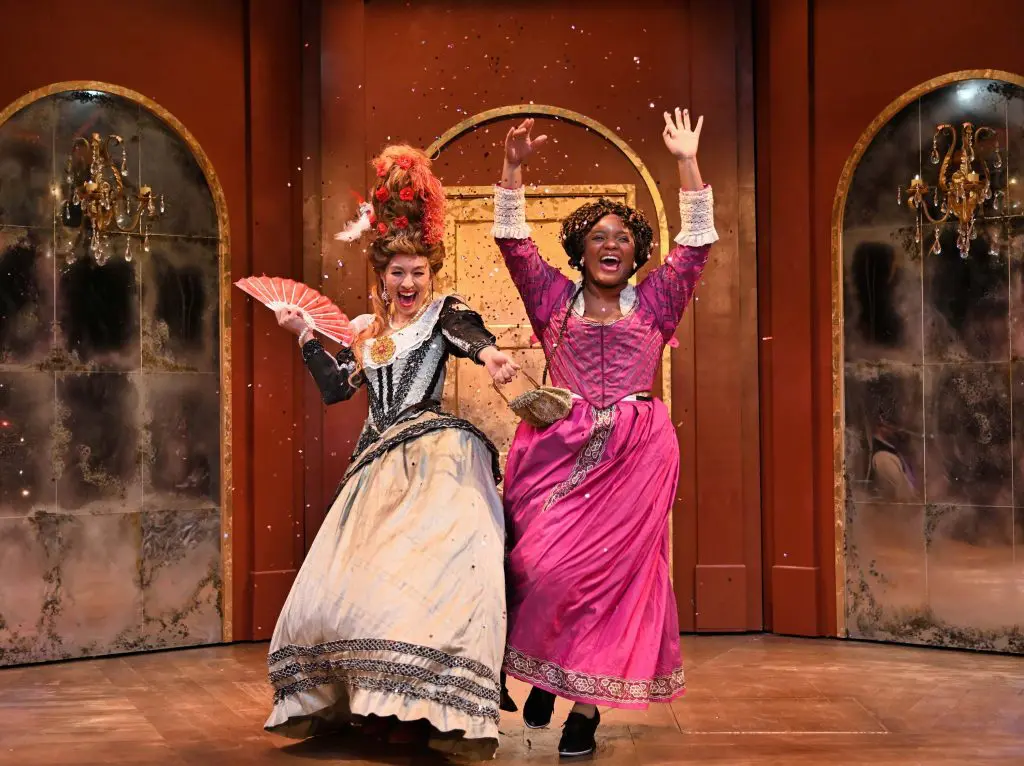Alexander Crespo Rosario, Eddy Tavares, and Victor Machado in La Mancha. Photo by Marta V. Martinez.
Haga clic aquí para la versión en español de este artículo.
Teatro en El Verano is Rhode Island Latino Arts (RILA’s) bilingual Spanish/English summer theater program, presented in association with Trinity Rep. This summer, they’ll produce a touring production of La Luz Verde, an adaptation of The Great Gatsby. We sat down with Catia (Sueño), one of Providence’s most promising young theater artists, about adapting F. Scott Fitzgerald’s classic for the Latinx community.
How did you get involved in theater?
I’ve always loved the movies, but there were no programs in place for me to do that growing up. My high school didn’t really have any drama clubs, either. But as I was growing up, a lot of people knew me to be very dramatic. I remember my art teacher in sixth grade telling me that. And when Viola Davis was nominated for the Oscar for Doubt, my teacher said, “This woman, who came from the same place as you, is doing things that I think you could do, too.” That kind of stuck with me in the back of my mind, but I still didn’t think it was possible.
When I applied to college, I was very much convinced that I was going to major in fashion design. So, I chose to go to the University of Rhode Island because they offered fashion, but also had a theater program that I wouldn’t have known about if not for the YouTube promo featuring Andrew Burnap (URI alum and Tony Award-winner). But as it turns out, fashion didn’t work out. Turns out I can’t sew worth a dime! I took a theater class my freshman year just to see if I was any good at it, and I haven’t really looked back since.

What is your previous experience with Teatro en El Verano?
When I was in college, one of my friends, Arturo Puentes (Sueño, A Christmas Carol understudy) told me he was doing it, and getting paid, which was a big deal, since back then, we were doing it all for free! So I auditioned in 2018 for La Tempestad, but had to drop out due to scheduling conflicts. In 2019, I auditioned again, and this time was cast as Benny (Benedick) in Tanta Bulla … Y Pa’ Qué?/Much Ado About Nothing, and that was one of my best experiences ever. Last year, I directed La Mancha, a bilingual adaptation of Don Quixote. So I’ve been working with Teatro for a while, but this will be my first year writing for them.
This year, Teatro en El Verano is presenting your adaptation of The Great Gatsby, called La Luz Verde (The Green Light). Do you have a connection with the original story?
Like a lot of people, I read it in high school. I was obsessed with it, mainly because of the way that my teacher would do our reading. We’d go over each chapter we read as if recounting an episode of a soap opera!
I remember literally screaming when (spoiler alert) Myrtle got hit by Gatsby’s car. And I pieced together that it was Daisy driving, but at the time, some of my classmates said “No, women couldn’t drive back then, it couldn’t have been her!” This was a huge argument, but we were so engaged as students and obviously we know now that I was totally right.
Beyond that, I love the glitz and glamour of F. Scott Fitzgerald’s world. I’ve seen adaptations of The Great Gatsby that I felt left much to be desired, so I started dreaming up my own version.
Without spoiling too much, tell us a bit about your adaptation.
The storyline is the same Gatsby you know. I just mainly looked at it through a different lens, particularly a BIPOC (Black, Indigenous, People of Color), Hispanic lens. I used things I found in the book that I found interesting in terms of intersectionality.
Like at one point, the characters are talking about race, and Tom, who’s incredibly racist, basically says “Everyone here is white, right?” And for a split second, they all just look at Daisy and she doesn’t really answer the question. I found that really interesting and used that as a starting point in terms of the themes of race and class in this adaptation.
I also wanted to capture the nuances of being rich, and how these characters are always so secretive with each other.
In the script, Spanish is the language the characters speak when they’re showing compassion, reaching out to others, or being more genuine. I hope audiences ask, “Why is the character speaking Spanish, or English, right now?” And when characters are using different languages in the same conversation. I tried to get all of those nuances in there.
I also wanted to make sure most of the famous, quotable lines were in Spanish, because Spanish speakers may be less familiar with Gatsby. But I definitely put hints there for English speakers, so they know when those lines are coming up
What are you most looking forward to?
I can’t wait to see what our director, Kufa Castro, and our actors do with the script. I wrote some really interesting stage directions, so I’m looking forward to their creativity in making that happen.
I’m also excited to bring this story to Hispanic audiences. I’m sure most of us saw the Leonardo DiCaprio version, and he’s great in that. But at the end of the day, Gatsby’s about the American Dream. A concept Hispanic/Latinx people are familiar with as so many strive to achieve it. I think the community will really relate to the adaptation we’re bringing to the table.
Anything else we should know?
Support BIPOC theater! And if you’re surprised as to why it doesn’t get made more, ask yourself: When was the last time you saw a show that was BIPOC-led or made?
